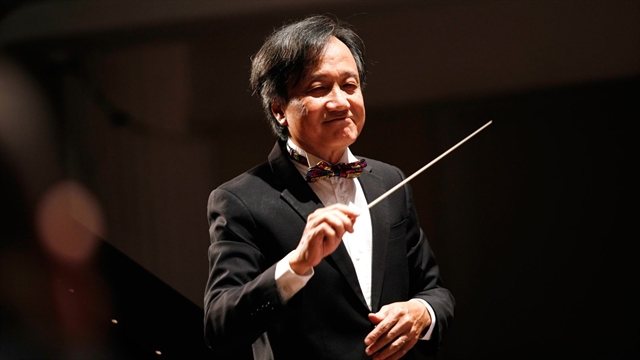 Life & Style
Life & Style

Trần Vương Thạch, Director of the HCM City Ballet Symphony Orchestra (HBSO), was granted the title Knight of Arts and Letters (Chevaliers des Lettres et des Arts from the French government for his efforts to promoting arts exchange between Việt Nam and France.

|
| Conductor Trần Vương Thạch, director of HCM Ballet, Symphony and Orchestra. Photo sggp.org.vn |
Trần Vương Thạch, director of the HCM City Ballet Symphony Orchestra (HBSO), was granted the title Knight of Arts and Letters (Chevaliers des Lettres et des Arts from the French government for his efforts to promoting arts exchange between Việt Nam and France.
Sài Gòn Giải Phóng (Liberated Sài Gòn) newspaper reporter Thúy Bình interviews director Thạch about the award and co-operation between his theatre and international art troupes
How did you feel when you received the title from the French ambassador to Việt Nam Nicolas Warnery?
It was an honour to be granted the title and it was also a nice surprise for me. This is a valuable reward recognising my work and contributions to art and cultural exchange development.
Above all, this is not my award alone but also the entire group of HBSO artists for their efforts to contribute to the development of arts over the years.
I think that all awards or recognition will encourage artists.
Could you tell us about the co-operation between your theatre and French troupes?
We have co-operated with French artists performing concerts, operas and dances. However, the opera Fredegonde in 2017 has been seen as the highlight of our repertoire.
It was penned by French composer Camille Saint-Saens. More than 125 years ago, he came to live on Côn Đảo Island in the southern province of Bà Rịa Vũng Tàu for several months and completed the opera.
Performing the opera helps to rediscover the history of an artwork related to Việt Nam and France in a special period of history.
In the work, I found a very Vietnamese melody with characteristics from the south of Việt Nam. It was shown by the composer skillfully.
It is very interesting and I will spend time to research carefully to have a professional analysis.
One time I visited France, I came to museums, libraries and theatres in Paris to find the original version in 1895. I found and copied it.
Right after I returned home, I thought about staging the opera with Vietnamese and French artists.
I sought financial support and co-operation with French artists. The Consul General of France to HCM City gave us financial support. It took two years to have money enough to stage the opera.
The opera has been a milestone of cultural-historical and diplomatic relationship between Việt Nam and France.
Since then I set up close relations in the culture and diplomatic fields with the French artists with strong support from the Consul General of France.
Over the years, we have enriched the HBSO’s repertoire with the participation of French artists.
Plus, we are also active to perform high-end shows aiming to popularise ballet, opera and classical music.
As a director of HBSO which has nearly 30 years of history, what do you think it takes to perform well?
At present, the theatre’s infrastructure is poor. We have Thanh Vân Theatre, which is degraded, for artists to rehearse. We don’t have an office and we have to rent a place for performances.
Last year, we proposed the city’s culture authority allot Cao Đồng Hưng Theatre to us. But there has been no official decision from city authorities.
Infrastructure is the most important thing for an art troupe. At present, HCM City has only the Municipal Theatre meeting the minimum standards of a small theatre for performing such as techniques of sound and light and seating.
Payments for artists are also an issue. This problem has existed for a long time and raised a lot of concerns but has not changed much.
It is necessary to have discussions to find solutions right away because good remuneration will contribute to preserving and building the culture. From there, the social-cultural standard will be improved.
I think we need a special mechanism and policy for ballet dancers whose physical health is impacted seriously.
What concerns you most as a manager?
I want to talk about the city’s plan to turn HBSO into a business. As the COVID-19 pandemic hits the world, I confirm that it should not be done. We cannot make a profit as a business because there is not much of an audience to come to classical art performances.
Plus, we have to invest in human resources and equipment. I think the best thing for HBSO is to be partly invested from the State budget.
This is an ideal model for HBSO. Many theatres in the world are running with support from the government.
During the six past months due to COVID-19, we haven't had any income and we have only the State budget to pay the artists.
The right policy and the right model will determine the existence of the theatre in future. VNS




